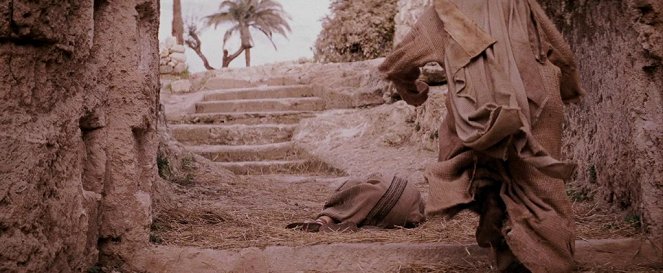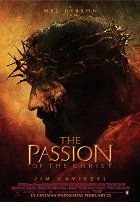Directed by:
Mel GibsonScreenplay:
Mel GibsonCinematography:
Caleb DeschanelCast:
James Caviezel, Maia Morgenstern, Hristo Jivkov, Francesco De Vito, Monica Bellucci, Mattia Sbragia, Toni Bertorelli, Luca Lionello, Hristo Shopov (more)VOD (2)
Plots(1)
The Passion of the Christ focuses on the last twelve hours of Jesus of Nazareth's life. The film begins in the Garden of Olives where Jesus has gone to pray after the Last Supper. Jesus must resist the temptations of Satan. Betrayed by Judas Iscariot, Jesus is then arrested and taken within the city walls of Jerusalem where leaders of the Pharisees confront him with accusations of blasphemy and his trial results in a condemnation to death. (official distributor synopsis)
(more)Videos (1)
Reviews (7)
The Passion of the Christ is an intimate, almost theatrical film with a breathtaking big-screen concept. Its essence lies not in the monumental historical setting, but in the impressiveness of the scenes shot with utter perfectionism and taking place – whether in the interiors or exteriors – on a few dozen square metres. The film begins with the scene of a hunt for “a desperate young man”, continues with his lynching and ends with his death. We only learn who is hiding under the hood and who the other faces on the screen are from brief flashbacks during his torture. The revelation of their identities deepens our relationship to Jesus of Nazareth as well as our experience of the pain that the characters are enduring. The film’s power consists in its depiction of the indescribable suffering of a man with a big heart at the hands of heartless people. ___ Mel Gibson chose the honorable way of storytelling without a hint of sentimentality. He remains impartial and literally revels in the man’s lynching. In slow motion and in the mounting pain of the sufferer, he gives us a sense of both his physical pain and the barbarity of his executioners’ sadistic urges. This shockingly cold beginning in the first third of the film has us riveted to our seats, while later flashbacks to Jesus’s spiritual pronouncements give it meaning, emotion and a philosophical dimension while intensifying its overall macabre nature. The martyr and his executioners become increasingly expressive embodiments of the values of good and evil, and together create a “work” that will change human history forever. ___ The film maintains a slow pace and runs more than two hours, but you won’t find a single shot, sound or cut that doesn’t have its place in it or doesn’t evoke the required emotion in you. It is a hypnotically fluid, sombre poem, carrying on its shoulders a tremendous weight of urgency that deepens with each passing minute. You either avert your eyes or hold your breath, or ponder what has been said.
()
A standard large-scale film production, baroque rigid faces of the actors, an attempt at distinctive artistic stylization, self-purpose escalated brutality, excellent soundtrack.... And all this is in the service of the sacred purpose of the film. Mel Gibson and Benedict Fitzgerald have chosen a very simple script trick, wherein they put reminiscences of the long-suffering and hardship of Jesus Christ in convenient places on familiar gospel scenes to reinforce the film's message. A message that I personally consider to be the most problematic part of a newly born phenomenon. This phenomenon speaks precisely to the part of the audience that is knowledgeable about biblical themes. It speaks in a way that is not dialogical, but purely illustrative. Here is the hero, this is what the evil Pharisees and the gloating people of Jerusalem did to him, and now you must feel indebted to him. Who Christ was, what is his message to the world — that is what The Passion of the Christ deals with very sketchily. It's not a testimony, but rather just a bloody portrayal of one of the greatest stories in human history. The biggest and most impressive. Mel Gibson actually gave the best testimony of the state of contemporary American cinema. The viewer is no more than sitting and staring while the "narrator" thinks for him. No one asks you to think, ask, or interpret during the film; even the strongest — that is, Christ's struggle with doubts about his mission — must be thematized into an embarrassingly literal character of the devil. Your only mission is to monitor the flow of carefully chewed and thoughtful "pseudo-reality", which has completely lost its symbolic validity and becomes a bloodthirsty direct transmission from the greatest execution of antiquity. And so, as the blood squirted into the orchestra, the makeup-smeared James Caviezel soiled the ground with artificial raspberry juice and made throaty sounds, I remembered a medieval liturgical drama where the same story is depicted with perspective and human kindness – loosely, playfully, with imagination, and it was a hundred times more impressive. Because while this is a celebration of human life, Gibson's "masterpiece" is merely a deafening invocation of deified death. Or: a "media event" once again triumphed over artistic quality... Not as bad or as good a film as some say.
()
Gibson has undoubtedly achieved what he set out to do, and it can’t be denied that the film has a powerfully immersive atmosphere and an impressive level of craftsmanship in some moments. Unfortunately, however, it fails where it wanted to be strongest: as a story about an unjust amoral judgment, about the failure of human faith and the rekindling of hope for its resurrection. Gibson relies only on the general idea that Jesus was a benevolent shepherd and that we must automatically pity him in his suffering, so he disregards any coherence of message and half-heartedly presents boring flashbacks or shocking physical torture that lasts unnaturally long and becomes the main motif of the entire film. And although I had a really big lump in my throat at the finale and watched the horror with bated breath, I don't understand why something like this was made in the first place. Or I do, for money, of course. The very idea and structure of the work are too simple and misleading to translate into something more historically and cinematically valuable or inspiring.
()
No hyperactivity turning to faith and as a result fortunately no exaggerated controversy. The crucifixion is brutal and cruel, but also impressive, touching, and surprisingly grand. Its fascinating atmosphere drew me in despite some prejudices, and I am glad that ten years after its creation, Gibson's opus is finally receiving positive reviews. This film is definitely not easy to love, but it is quite easy to be amazed by it.
()
Those brutal scenes that everyone take dso much about weren't really that terrible. Rather than being naturalistic, they were just very bloody. In terms of craftsmanship, it is again precise, but that is not new for Mel Gibson. As for the content, there is nothing left but to describe it as controversial. The music is breathtaking.
()
Gallery (96)
Photo © 2004 Icon Productions



Ads